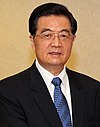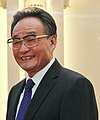2012 National People's Congress
| |||||||||||||
|---|---|---|---|---|---|---|---|---|---|---|---|---|---|
| |||||||||||||
| Website | |||||||||||||
| 2012 NPC official website | |||||||||||||
Politics of China |
|---|
 |
|
The 5th Session of the 11th National People's Congress held its annual meeting in March 2012 at the Great Hall of the People in Beijing, China. The event opened on 5 March and concluded on 14 March. Premier Wen Jiabao delivered his work report as Premier.[1]
Government work report[]
Premier Wen delivered the central government's work report on 5 March, stating GDP growth will be at 7.5 percent.[2][3][4] This is slower than the 8 to 10 percent of preceding years and decades.[5] The government is targeting inflation to be around 4 percent.[2][3] Wen also indicated about 9 million new jobs will be created in towns and cities.[3] The official urban unemployment rate is expected to be 4.6 percent or lower.[2] He mentioned China's volume of total exports and imports is projected to be about 10 percent.[2][3] Central government will need to make further reforms in industrial restructuring, innovation, energy conservation, and emissions reduction, and real income increases for the people are in line with economic growth.[2][3]
The work report reflects the growing challenges of managing growth and subduing inflation while the Communist Party maps out a leadership transition and at the same time maintaining high employment and a high emphasis on safeguarding stability.[2][6]
Premier Wen's press conference[]
In this year National People's Congress convention, there were intense domestic and international media interest on Premier Wen and his views as this is his last year in office, home stretch to retirement.[7] The media also wanted to hear Premier Wen's assessment of his term in office, insights to the challenges to the future and the legacy he will leave behind.[7]
In the premier's last official press conference for his work report, he emphasized China requires further economic and political reforms to keep the gains from over the years and keep on improving people's livelihoods.[8] Wen alluded to the Cultural Revolution which was a travesty for the Chinese people and political reforms should still continue.[8] He reflected there were many unfinished business and regrets in his nine-year stint as premier.[8] Wen was apologetic for the social and economic problems over the last decade and conceded there were room for improvements and took responsibility for it.[8]
Wen also reiterated poignantly the investigation into the Wang Lijun incident in Chongqing had yielded significant progress and local authorities should ponder and learn from the incident.[8][9] On 15 March 2012, Bo Xilai the Chongqing party chief has been replaced.[10]
The premier stressed the new leadership will need to press on with political structural reform which are necessary to implement successful structural economic reforms.[11]
References[]
- ^ "The National People's Congress: Satisfy the People". The Economist. 11 March 2012. Retrieved 12 March 2012.
- ^ a b c d e f Zhou, Xin; Yao, Kevin (4 March 2012). "China sets 2012 growth target at 7.5 percent, stability key". Reuters.
- ^ a b c d e "Highlights: Premier Wen's government work report". English.news.cn. Xinhua, english.news.cn. 5 March 2012. Retrieved 15 March 2012.
- ^ Bruce Einhorn (5 March 2012). "Why China Is Suddenly Content With 7.5 Percent Growth". Bloomberg L.P.
- ^ English.news.cn (5 March 2012). "Premier Wen's government work report". Xinhua.
- ^ Wei Gu (6 March 2012). "Chinese leaders pick stability over reform". The Sydney Morning Herald.
- ^ a b Cui Jia (15 March 2012). "Premier Wen Jiabao takes his final bow". China Daily.
- ^ a b c d e BBC (14 March 2012). "China's Wen Jiabao says 'reforms urgent'". BBC.
- ^ Thomson Reuters (14 March 2012). "HIGHLIGHTS-China Premier Wen Jiabao's comments at NPC press conference". Thomson Reuters.
- ^ BBC News (15 March 2012). "China removes Bo Xilai from Chongqing leader post". BBC. Retrieved 15 March 2012.
- ^ Philip Wen (15 March 2012). "Wen Jiabao gets ready to leave the stage – with profound apologies". The Sydney Morning Herald.
External links[]
- 2012 in China
- National People's Congresses



